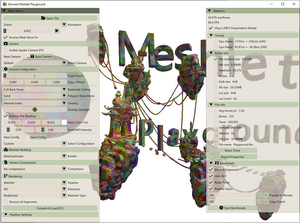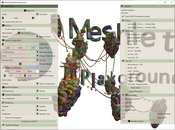Information
- Publication Type: Bachelor Thesis
- Workgroup(s)/Project(s):
- Date: October 2024
- Date (Start): January 2023
- Date (End): October 2024
- Matrikelnummer: 01326608
- First Supervisor:
- Keywords: compression, vertex data, vertex compression, meshlets, mesh shaders
Abstract
Vertex compression helps to enhance the performance of real-time rendering applications, making it a valuable technique in modern computer graphics. In this work, we investigate current state-of-the-art methods for the compression of positions, normals, texture coordinates and blend attributes. Our primary objective is to efficiently compress blend attributes in rigged meshes, particularly focusing on bone weights and indices. We leverage a recent hardware advancement: the mesh shading pipeline. This pipeline enables us to propose a novel compression scheme for blend attributes, which achieves a significant reduction in memory usage of up to 92.75% compared to existing state-of-theart methods using a traditional rendering pipeline. Additionally, we briefly discuss and compare different meshlet building algorithms, meshlet buffer structures, and meshlet extensions within the Vulkan framework. Finally, the proposed codecs are validated through a series of benchmarks focused on resource utilization and performance.Additional Files and Images
Weblinks
No further information available.BibTeX
@bachelorsthesis{kimmersdorfer-2024-vcpr,
title = "Vertex Compression with Mesh Shaders for Skinned Meshes",
author = "Gerald Kimmersdorfer",
year = "2024",
abstract = "Vertex compression helps to enhance the performance of
real-time rendering applications, making it a valuable
technique in modern computer graphics. In this work, we
investigate current state-of-the-art methods for the
compression of positions, normals, texture coordinates and
blend attributes. Our primary objective is to efficiently
compress blend attributes in rigged meshes, particularly
focusing on bone weights and indices. We leverage a recent
hardware advancement: the mesh shading pipeline. This
pipeline enables us to propose a novel compression scheme
for blend attributes, which achieves a significant reduction
in memory usage of up to 92.75% compared to existing
state-of-theart methods using a traditional rendering
pipeline. Additionally, we briefly discuss and compare
different meshlet building algorithms, meshlet buffer
structures, and meshlet extensions within the Vulkan
framework. Finally, the proposed codecs are validated
through a series of benchmarks focused on resource
utilization and performance. ",
month = oct,
address = "Favoritenstrasse 9-11/E193-02, A-1040 Vienna, Austria",
school = "Research Unit of Computer Graphics, Institute of Visual
Computing and Human-Centered Technology, Faculty of
Informatics, TU Wien ",
keywords = "compression, vertex data, vertex compression, meshlets, mesh
shaders",
URL = "https://www.cg.tuwien.ac.at/research/publications/2024/kimmersdorfer-2024-vcpr/",
}



